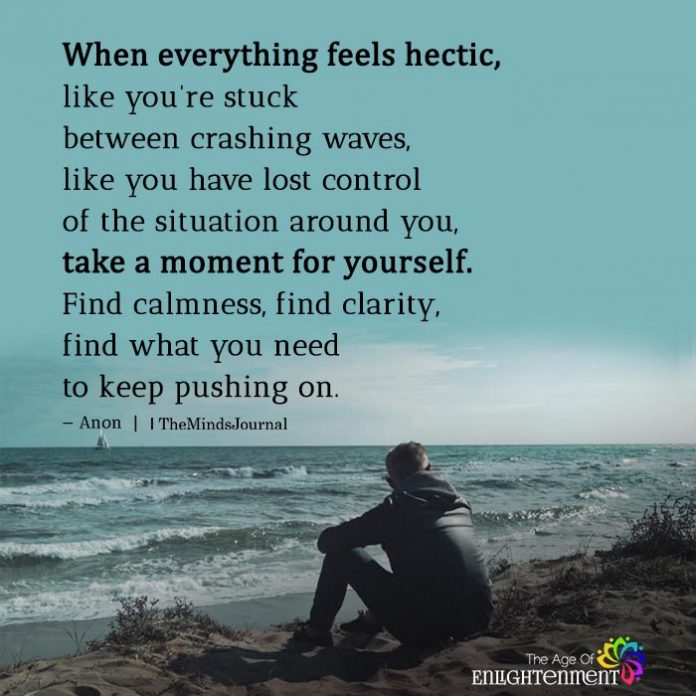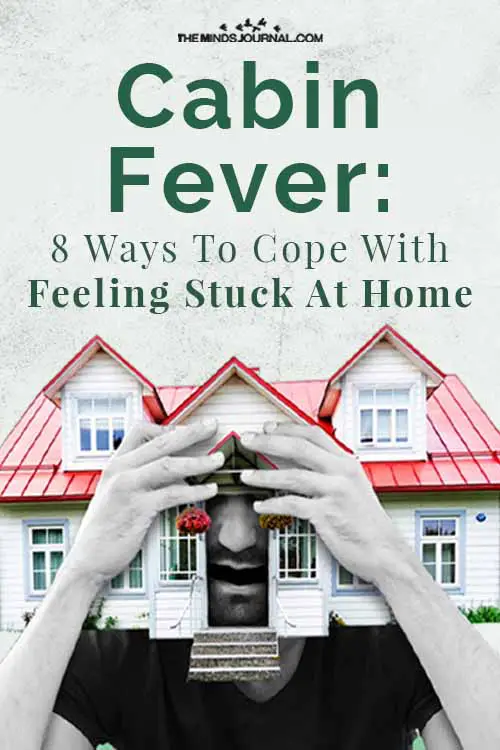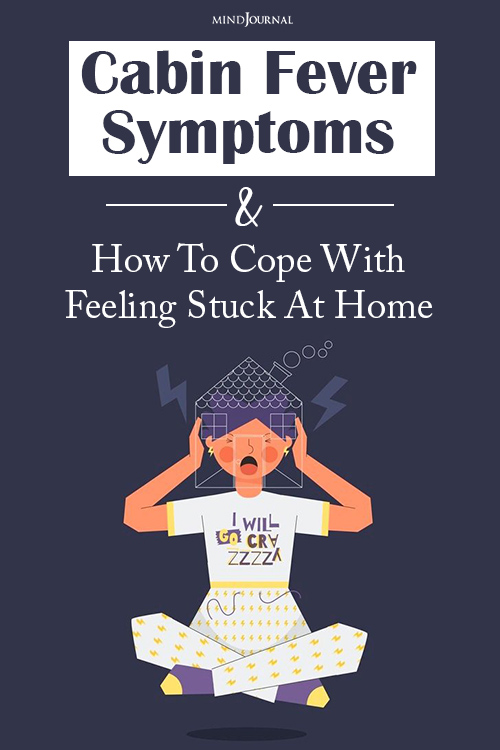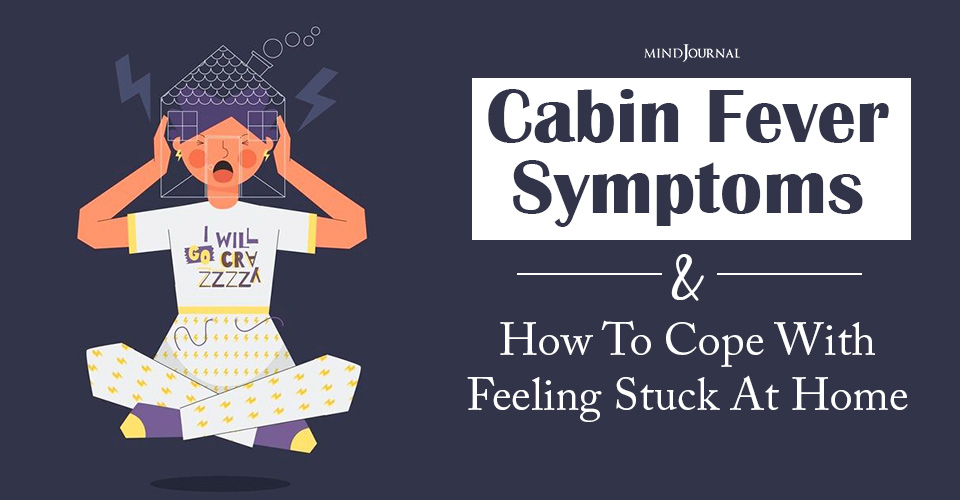Feeling lonely, bored, sad, and lethargic? Unable to cope with feelings of isolation? You just might be experiencing claustrophobia and cabin fever.
Cabin fever is usually related to bad weather during the monsoons or a blizzard during winter. However, during this ongoing COVID-19 pandemic most of us are feeling the weight of cabin fever due to social isolation. Staying home is important for saving lives. But staying inside all the time is leading to claustrophobia and making us unmotivated and irritable.
What is cabin fever?
The term cabin fever refers to feelings of claustrophobia that we can experience after being confined to a single location for a long period of time. It makes us feel distressed, irritable, and restless. It is not a medical diagnosis but a series of emotions and symptoms that may occur in such situations.
Associate professor and holistic healthcare expert Dr. Debra Rose Wilson, Ph.D., MSN, R.N., IBCLC, AHN-BC, CHT explains, “Cabin fever is a series of negative emotions and distressing sensations people may face if they’re isolated or feeling cut off from the world.”
She adds “Cabin fever isn’t a recognized psychological disorder, but that doesn’t mean the feelings aren’t real. The distress is very real.”

Due to the coronavirus pandemic, most of us are feeling the effects of self-quarantine and social distancing. Not only is it making us feel isolated, but it is also making us feel stressed and anxious. Dr. Wilson believes that the “feelings of isolation and loneliness are more likely in times of social distancing, self-quarantining during a pandemic, or sheltering in place because of severe weather.”
Read: 4 Strategies That Will Make Coping With Coronavirus Stress Easier
Symptoms of cabin fever
Cabin fever goes beyond the feelings of boredom. They are based on strong feelings of isolation and claustrophobia. Identifying the symptoms can help us understand how to cope with self-isolation in a better way.
Although not everyone will experience the same symptoms, here are some of the most common effects of being isolated for too long:
- Decreased motivation
- Lethargy
- Irritability
- Depression/sadness
- Restlessness
- Lack of patience
- Hopelessness
- Insomnia/change in sleeping patterns
- Difficulty waking up
- Lack of concentration
- Food cravings
- Distrusting others
It should be noted that some of the symptoms mentioned above could also indicate other serious disorders. If you believe that these symptoms are affecting your disorders, it’s best to consult a mental health professional.
Read: 8 Techniques For Reducing Anxiety And Stress Right Now
How to cope with cabin fever
Dr. Debra Rose Wilson writes “The coping mechanism that works best for you will have a lot to do with your personal situation and the reason you’re secluded in the first place. Finding meaningful ways to engage your brain and occupy your time can help alleviate the distress and irritability that cabin fever brings.”
There are certain things we can do to combat feelings of claustrophobia and cabin fever if our symptoms are comparatively mild. The following steps can help us improve our state of mind and feel better about ourselves.
Here are a few ways you can start coping with the effects of long-term isolation:
1. Step outside
It might be a bit difficult to go outside freely under the present circumstances, and that’s not something that is recommended. But if you can get out of your house and go outside, make sure to take advantage of it, even if for a short while. Get some sun when you go out for groceries or for other essential work. Also, try to spend more time in your backyard and soak in some daylight.
Research shows that exposure to the sun can help to manage our body’s natural cycles, produce endorphins and make us feel better naturally. In fact, spending time in nature is good for our mental health. One 2019 study found that “a growing body of empirical evidence is revealing the value of nature experience for mental health.”
Debra Rose Wilson, Ph.D. explains “Not only does spending time outdoors boost your cognitive function, it may also help improve your mood, alleviate stress and boost feelings of well-being.” Taking a short walk can be highly beneficial. In case, going out is not a possibility, then spend some time near your window, patio, porch, balcony, or terrace.

2. Follow a routine
Although you may not be able to stick to your previous routine while being house-bound, you can always create a new routine that will fit with your current lifestyle. Make sure to include all the necessary and leisurely activities in your schedule and follow that as closely as you can.
“You may not have a 9-to-5 job to report to while you’re isolated, but a lack of routine can cause disruptions in eating, sleeping, and activity,” explains Dr. Wilson. So make sure you create a routine that you can follow daily and include your work, chores, mealtimes, projects, exercise, and downtime as well. Dr. Wilson adds “Having an outline for your day helps you keep track of the trajectory of your hours and gives you mini ‘goals’ to hit throughout the day.”
Read: Using Psychology to Deal with Crisis: How to Manage Worry and Anxiety During Covid-19
3. Set short-term goals
When you’re experiencing cabin fever, you may feel demotivated, lethargic, and lazy. You may end up wasting a lot of time without accomplishing anything out of it. So it’s important that you set some simple daily and weekly goals that you can pursue. Track your progress and measure the level of accomplishment once complete. However, you need to set realistic and reasonable goals that you can achieve and succeed in. Reward yourself for every single accomplishment.
4. Be more social
You may not be able to meet your friends, go on a date, or go to the movies during this pandemic, but you can still hang out with your friends online. Debra Rose Wilson, Ph.D. writes “Use real-time video streaming services, like FaceTime, Zoom, or Skype, to chat with your friends, colleagues, and loved ones. Face-to-face chat time can keep you in contact with the ‘outside world’ and make even your small home feel a whole lot bigger.”
Moreover, talking with people who are experiencing the same thing as you are can help you share your thoughts and feelings, gain some new perspectives and find creative solutions.
Read: 5 Lessons That This Crisis Taught Us
5. Get creative
Being isolated can be a good time to explore your creative talents. If you used to paint or draw or play a musical instrument or had any creative interests earlier, then this is the perfect time to restart. Get back to your creative passions and hone your skills. This can be beneficial in multiple ways. According to a 2019 study by Radwa Khalil, Ben Godde, and Ahmed A. Karim, being creative “is one of the gateways for achieving fabulous success and remarkable progress in professional, personal and social life.”
Another 2018 study by James Kaufman reveals that “Existing studies suggest that higher levels of creativity may enable people to have more meaning in their life and to be happier.”
Dr. Wilson suggests “Use your time in isolation to reconnect with creative activities that you’ve had to put on hold because life got too busy. Spending time on creative activities keeps your brain busy. Keeping your mind occupied and engaged may help ward off feelings of boredom or restlessness and make the time pass more quickly.”
6. Workout
When you can’t leave the house and start feeling the effects of cabin fever, starting to exercise can be a great way to deal with it. Regular physical exercise can help you channel your excess energy and make you feel better physically, mentally, and emotionally. A 2006 study showed that “There is incontrovertible evidence that regular physical activity contributes to the primary and secondary prevention of several chronic diseases and is associated with a reduced risk of premature death.”
Another study revealed that exercise helps to improve “mental health by reducing anxiety, depression, and negative mood and by improving self-esteem and cognitive function.” It can also help to reduce symptoms like low self-esteem and social withdrawal. One study by M.H.M.De Moor and associates found that working out on a daily basis “is cross-sectionally associated with lower neuroticism, anxiety and depression and higher extraversion and sensation seeking in the population.”
You can check out different home body-weight and cardio exercise videos and tutorials to get started immediately.
Read: Best Home Workout Ideas To Stay Fit While Stuck At Home
7. Relax and enjoy some alone time
Instead of getting engrossed in feelings of cabin fever, try to use this time to enjoy some much-needed ‘me-time.’ So take some time off from everything and just do things that you enjoy. Read a book. Watch a movie. Listen to music. Cook. Sleep. Whatever.
Dr. Debra Rose Wilson explains “Give yourself time “away” from others to relax.” You can also use this time to improve your mental health and practice meditation. “Mindfulness, deep breathing, and relaxation exercises may help you maintain your emotional health and balance feelings of isolation or frustration,” adds Dr. Wilson.
Read: Time Alone (Chosen or Not) Can Be A Chance To Hit the Reset Button

8. Seek help
Anxiety can often be the reason for symptoms of cabin fever. In case, you think that your symptoms are not getting better, make sure to talk to your loved ones and ask for help. Talking to a doctor or a mental health professional can help you get better.
UCLA psychologist David Bresler, Ph.D. explains “People with persistent sleep difficulties may need medications or other appropriate treatments. When you’re sleep-deprived, it can have serious consequences on your performance, including an increased risk of automobile accidents.”
Staying indoors to save lives
Being social is a natural instinct. Hence, social distancing and staying home for an extended period of time can certainly invoke feelings of cabin fever. However, it is crucial that we follow the guidelines laid down by local authorities and reduce the risk of spreading coronavirus.
Dr. Wilson concludes “Whether you’re sheltering at home to avoid dangerous weather conditions or heeding the guidelines to help minimize the spread of disease, staying at home is often an important thing we must do for ourselves and our communities.”
Do what is necessary and keep your mind engaged to combat the feelings of isolation, claustrophobia, and cabin fever.
Stay inside. Stay safe.
Read: 16 Fun Things To Do To Fight Boredom During Lockdown and Self Isolation
Here is an interesting video that you may find helpful:










Leave a Reply
You must be logged in to post a comment.